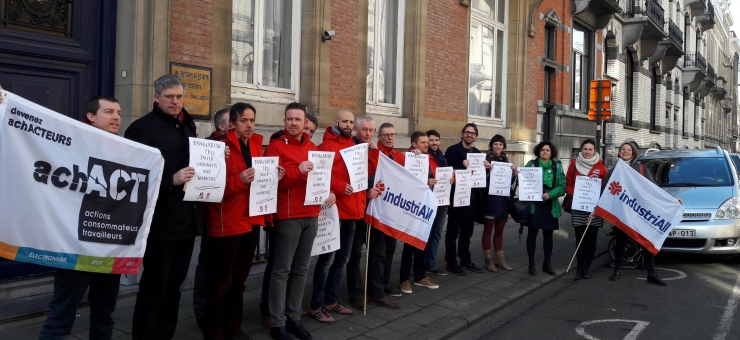European trade unions calling for release of jailed workers at embassy of Bangladesh – #EveryDayCounts

9 trade union leaders were arrested over the weekend in Chittagong
Trade union offices ransacked and vandalised, leaders arrested and imprisoned, workers and organizers in hiding for fear of retribution – this is the face of Bangladesh’s punitive crackdown on labour. The situation is deteriorating further – 9 trade union members were arrested over the weekend in Chittagong. They have since been released, but the charges have not been dropped.
On Thursday 16 February, European trade unions came together in front of the Embassy of Bangladesh in Brussels to condemn the suppression of organised labour in Bangladesh and hand over a letter demanding the release of jailed workers. Since December, over 35 trade union leaders, organisers and workers have been arrested and detained for taking part in protests.
‘Trade union rights are a fundamental human right and it is simply unacceptable that these are being so systematically dismissed in Bangladesh,’ said UNI Europa Regional Secretary Oliver Roethig. ‘UNI Europa calls for the immediate release of all workers jailed for their trade union activism and activities, full respect for workers’ right to organise, and a guaranteed living wage and safe working conditions for all.’
‘The European Union cannot take an ambiguous position towards Bangladesh. Preferential trade relations must be directly linked to full respect of labour rights and the freedom of association. Detained trade union leaders must be released now and the European Commission must push for this” added Luc Triangle, General Secretary of IndustriALL Europe.
LBC-NVK’s Deputy General Secretary Veerle Verleyen pointed out that ‘the legitimate demand for a pay rise in the garment sector may not be undermined by arresting, intimidating, and firing trade union leaders and activists: trade union rights are human rights and therefore universal. LBC-NVK supports Bangladesh garment workers in their fight for recognition of their trade union rights.’
‘The Bangladesh government needs to turn away from cheap labour and deplorable working conditions. Trade unions are a necessity to avoid a repetition of the Rana Plaza calamity,’ said Erwin De Deyn, President of SETCa BBTK.
Sara Ceustermans, Coordinator Schone Kleren Campagne (Clean Clothes Campaign) concluded: 'This is the biggest setback for the garment industry since the collapse of Rana Plaza in 2013 and might cause the Bangladesh government to lose their key export market. It’s not possible to talk of a safe or sustainable industry in Bangladesh when even peaceful attempts to ask for workplace improvements are met with such disproportionate violence and repression. Garment workers in Bangladesh have the unequivocal right to organise and must be paid a living wage on which they can survive.'
UNI are coordinating a campaign under #EveryDayCounts together with IndustriALL and ITUC to defend trade unionists and end the repression of trade unions in Bangladesh.
Note IndustriALL and UNI have been at the forefront of improving worker rights and safety in the garment industry in Bangladesh, following the 2013 Rana Plaza factory collapse, which killed more than 1,100 garment workers. They were the drivers of the Bangladesh Accord, a legally-binding agreement signed by more than 200 global brands, to inspect 1,600 garment factories for fire and safety hazards. More than 74% of identified safety issues in the 1,600 factories have been reported and verified as fixed.

